BY CRAIG DANIELS AND KELLY PEDRO
It opened with an electrifying, visceral, 21st-century spin on Canada’s Indigenous origins – two aboriginal dancers in full regalia, moving to electronic rap, no less, courtesy of Six Nations Mohawk DJ Shub.
It closed with computer scientist and entrepreneur Rana el Kaliouby explaining why emotion will give us better machines.
From discussions about fake news, to warnings about cyber security, to gender diversity, to the ethics of AI, to ending the bro culture of Silicon Valley, the stated quest of True North – to rewire tech’s status quo – delivered as advertised, and more, on its first full day.

Indigenous dancers set to the beats of DJ Shub opened the True North conference.
(Communitech photo: Harminder Phull)
“And how amazing was that?” asked South African event host Talia Sanhewe, after the dancers’ attention-commanding performance Wednesday morning on the main stage at Waterloo Region’s Lot42 event centre.
And with her words, True North, the conference about “tech for good,” was officially under way.
“We put this conference together because there is an important conversation to have, and this is the time to have it,” Communitech CEO Iain Klugman told 2,000-plus attendees during his opening remarks.
The True North conference was conceived as a response to months worth of stories that called into question the trajectory of technology, the companies that make technology and, in some cases, the people running those companies. As Klugman himself said leading up the conference, the rationale for the event was to consider the broader implications of tech, “to talk about what real success should look like in a fast-changing, hyperconnected and increasingly polarized world.
“Concerns that technology is contributing to problems in the world led Communitech to search the world for people to come to True North and talk about how to ensure we build a bridge to a better future,” Klugman said Wednesday.
“We put this conference together because this is an important conversation to have, and this is the time to have it.
“The word ‘north’ is a powerful word. It defines who we are as a country. ‘True’ matters right now in a world where there isn’t a lot of trust.”
Trust, commitment, passion and engaging ideas and compelling narratives were the order of the day on both of the event’s stages, as well as at smaller breakout events, such as the workshop where delegates were invited to help craft a ‘Tech for Good Declaration.’
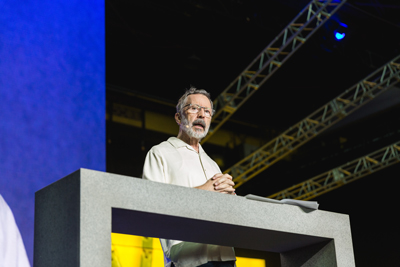
Ed Catmull, co-founder of Pixar Animation Studios,
gives the opening keynote at True North.
(Communitech photo: Harminder Phull)
The main stage’s leadoff speaker was Ed Catmull, the Pixar Animation Studios President and co-founder, who talked about how to help people reach their creative potential, and how to manage failure during the creative process.
“Every film, at some point along the way, has some significant failures,” Catmull said. Among his other observations:
""Powerful people should not start the discussion,"" during creative sessions. In fact, for the first 10 or 15 minutes, ""they should shut the hell up.""
Catmull additionally spoke about Apple co-founder Steve Jobs, Pixar’s former majority shareholder and one-time CEO. Jobs died in 2011. His fiery personality was legendary. His creative genius, undeniable.
“There was an arc to his life,” Catmull said. “Failures changed Steve. He learned from his failures. He developed the ability to listen. This change in him was real.”
And Catmull closed off with a decidedly True North statement:
“Your actions make a difference. Please use your opportunity to make the world a better place.”
Certainly speakers Michael Litt, CEO of Kitchener startup Vidyard, and Sarah Lacy, tech journalist and CEO of the startup Chairman Mom, did just that.
Litt, the afternoon’s leadoff speaker, went to work on the problem of bias in startup culture and how it hinders diversity and prevents women from joining the technology economy.
“We’ve been playing to that bias. How do we reverse the clock?” Litt asked. He offered a three-part solution: “Explore bias within yourself; provide permission as a leader to discuss bias and diversity, and finally to prioritize youth, who don’t come equipped with the same biases of older generations.

Sarah Lacy pulled no punches in breaking down the toxic masculinity of
Silicon Valley’s bro culture. (Communitech photo: Harminder Phull)
Lacy carried these ideas forward in forceful fashion, engaging an audience ready to hear about “detoxing the bro economy.
“The world hates and distrusts Silicon Valley, and with good reason,” she said.
She singled out in particular Facebook and Uber, two companies that generated headlines during the past year for decisions made over the use of data (Facebook) and for engaging in what she called “toxic masculinity” (Uber).
“These companies lost the moral high ground.”
She said the tech community has the opportunity to “do things differently,” to “rethink the ad-based business model,” to push venture capitalists to “get a moral backbone” and to lean in when it comes to hiring, funding and involving women.
“If Silicon Valley doesn’t reverse this loss of soft power and aspiration, is it still going to be the envy of the tech world?” she asked.
AI in focus
Meanwhile on Stage B, several speakers delivered their thoughts on the promise and fears associated with artificial intelligence, which grows more deeply infused into everyday life with every passing month, underpinning drones, autonomous vehicles, robots, and every manner of platform.
- Marylin Ma, of Kitchener-based Quali AI, which builds AI software designed for robots, said “we have a lot to look forward to when it comes to AI,” but said artificial intelligence is not as close to replacing humans as we may fear. But, she said, technology will generate more time to travel or spend time with our children, aging parents and other loved ones.
- Joseph Fung, CEO of Kiite Inc., a Waterloo-based startup that uses AI to transform the workforce, raised the prospect that your next co-worker could be a machine. While that may worry some people, it shouldn’t, Fung said, acknowledging that advances in AI come with real, hard ethical questions. “Fundamentally, it comes down to trust.”
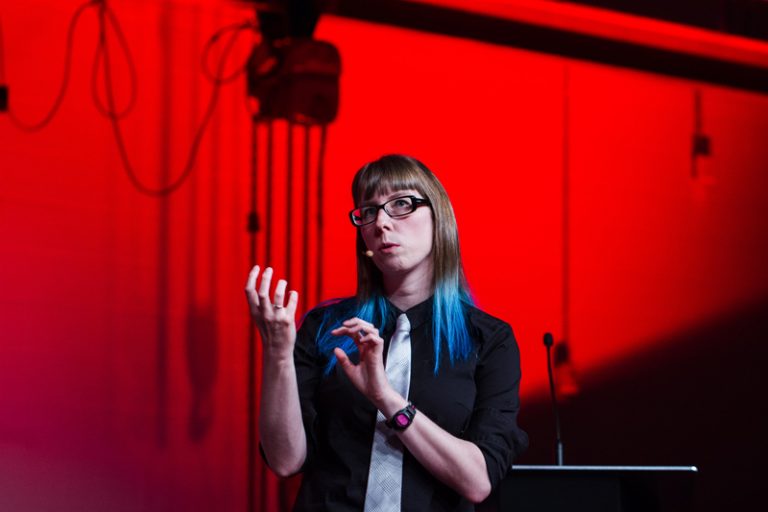
Suzanne Gildert speaking on Stage B. (Communitech photo: Sara Jalali)
- Suzanne Gildert, founder and CEO of Sanctuary.ai, a Vancouver-based company that builds human-like robots, asked if robots deserve the same rights as humans. Synthetic humans, she said, are going to be the biggest change our civilization will see, causing disruptive changes in our economy, our political systems, and affecting how we think and who we are, she said. Humans are used to being at the top of the food chain, but what happens when there are robots far more intelligent? “How is that going to make us feel?”
- Likewise, Ali Asaria, founder of Toronto- and Waterloo-based Tulip Retail, a mobile platform for retail workers, said that as AI develops, it forces us to rethink what it means to be human.
- Marcel O’Gorman, director of the Critical Media Lab at the University of Waterloo, said tech for good is not about creating ethics, but about building an ethos — guiding motives. That means thinking about who is left out by technology, who is in need and what are the consequences of the products being created. “Asking these questions could develop an ethos of something we could say is tech for good,” he said.
- And Francois Gand, founder of Nuro, which makes platforms that help people who can’t communicate because of a health crisis, such as a stroke, emphasized that AI has the potential to change lives. “Stroke patients may reach a point where life is meaningless, but what if we change that? Can we define this as tech for good?” he asked.
Digital red tape
Tackling big questions and problems was the order of the day. Still with Stage B, Hillary Hartley, Ontario's first Chief Digital Officer, spoke about cutting through the digital red tape. “We all know that people don’t operate their lives from 9 to 5 and in this day and age neither does business and neither should government,” she said.
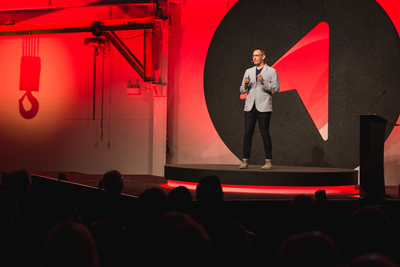
Craig Silverman, Buzzfeed media editor, on Stage B.
(Communitech photo: Harminder Phull)
Meanwhile, Canada’s Craig Silverman, the Buzzfeed media editor credited for coining the term “fake news,” pulled back the curtain on the ugly side of social media, revealing how people were manipulating platforms to make something seem popular when it’s not.
“Those influencers on Instagram may not be as influential as you think they are,” said Silverman, adding some are buying traffic for their websites, members for a Facebook group, or paying a company to get real accounts to like and comment on Instagram pictures.
As the average person consumes news, he said, it’s difficult to know what to trust, adding tech companies have a responsibility to think about how people will misuse their technology at the research and development stage.
“You can’t figure out how people are abusing and manipulating your product after it’s been launched,” he said.
Other Stage B speakers touched on cryptography, quantum computing and the erosion of social capital online.
Scott Totzke, CEO of Isara Corp., which specializes in cryptography, said quantum computing will help us have a safe digital lifestyle, but we have to ensure no one will exploit quantum computing.
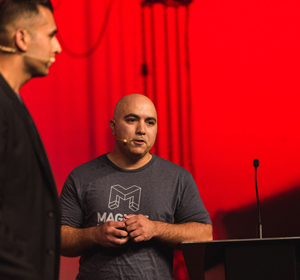
Neil Desai (left) and Jad Saliba of Magnet Forensics on Stage B.
(Communitech photo: Harminder Phull)
Neil Desai and Jad Saliba, of Magnet Forensics, a digital forensics company, invoked sociologist Robert Putnam’s best selling book Bowling Alone, in a discussion about the erosion of social capital online and how to rebuild trust. “If we don’t rethink our values, we’re going to live in digitally gated communities,” he told the crowd.
Values and the dark corners of the web were very much on the mind of former eSentire chief technology officer Mark McArdle, who spoke in the morning about the challenges of stopping those who aim to do mischief, including those who use the web to generate fake news.
“We’re now seeing the weaponization of social media,” McArdle said. “Defending against this is a difficult problem.”
Tools for those intent on achieving data breaches or manipulating users grow more sophisticated, and hackers, he said, “always have first-mover advantage.”
He invited coders and programmers to join in crafting new defences and security solutions. “Not all superheroes wear a cape,” he said.
The story that followed McArdle on the main stage certainly had a superhero feel to it.
Siyabulela Xuza told the the inspiring tale of growing up in rural South Africa, building rockets and making rocket fuel in his mother’s kitchen, going on to eventually attend Harvard and start a company called Galactic Energy Ventures, which aims to build more efficient batteries and supply power to African communities and the wider world beyond. Xuza said he once hoped to travel to Jupiter. He has since had a small planet near Jupiter named after him.
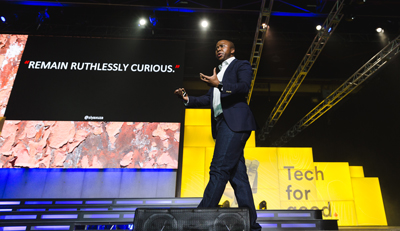
Siyabulela Xuza delivers a keynote on the main stage.
(Communitech photo: Harminder Phull)
“When you do what you love, the world will love what you do,” he said, adding that responsibility comes with the power inherent in technology and that we have a responsibility, therefore, to use our power for good.
“What is your Jupiter?” he asked.
In a talk about how cryptocurrency will solve inequalities, cryptocurrency expert Russell Verbeeten said Bitcoin proved currency could exist without a central bank. That makes it a game-changer.
It could be a fundamentally new way to monetize apps and compete with monopolies such as Facebook, said Ted Livingston, CEO of Waterloo-based Kik.
Stage B wrapped up with a talk about building an equitable community centred around four themes: transit, places, culture and community.
It included a passionate appeal from Isabel Cisterna, of Waterloo Region’s Neruda Arts, who called on the tech community to support artists.
“I’m going to ask you to invest in arts and culture. Not for me but for yourselves,” she said.
“If you invest $1 on us, we can leverage it five times to get provincial and federal grants to create that sense of belonging, to create that sense of placemaking. We can build an environment that is vibrant and healthy for all the people you want to attract, but most importantly for the people already here.”
True North, which soft-launched Tuesday, continues through Thursday, wrapping in the late afternoon.
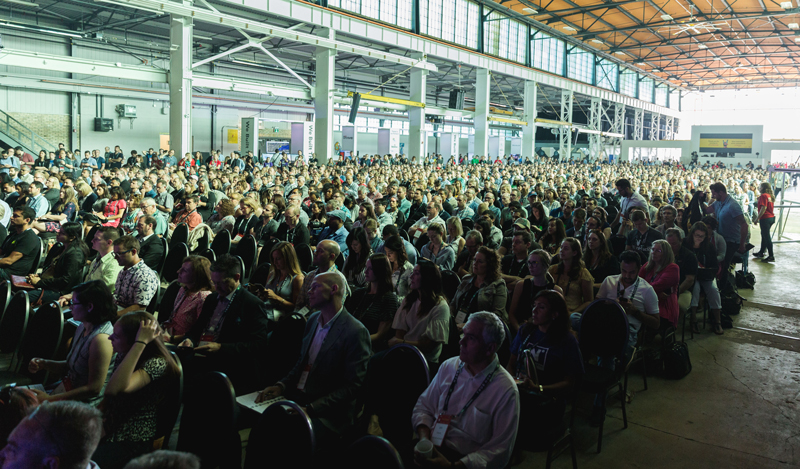
(Communitech photo: Harminder Phull)

